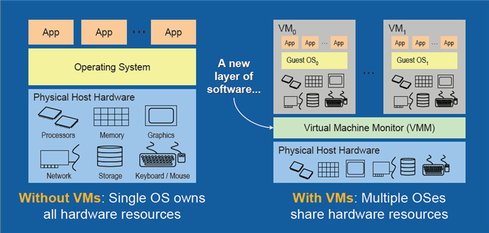In today’s day and age, most businesses have moved either all or a part of their operations online. Often times we hear that one technology is better than the other for a business to thrive in the web industry. One such technology that has become quite a buzzword recently is ‘Cloud Computing.’ Cloud Computing as a term is used for everything related to the cloud. Be it cloud services, cloud systems, platforms, web hosting, etc. Add to that the fact that there are some people who say the cloud is virtual (which is true) and hence, cloud computing and virtualization are same (well this isn’t entirely true).
In this article, we aim to help solve the confusion what is the difference between Virtualization and Cloud Computing and explain each in detail.
Let us first begin by understanding what Virtualization is.
Virtualization in simple words is the creation of a resource in the virtual form rather than its physical (actual) form. These resources can include a server, operating system, network, file, storage etc. The idea of virtualization is to simplify and easily manage workload such that it makes computing scalable.
There are 7 different types of virtualization viz OS virtualization, Application virtualization, Server virtualization, Administrative virtualization, Network virtualization, Hardware virtualization and Storage virtualization.
Take for instance Server virtualization. Here a physical server is partitioned into several virtual servers using a software known as a Hypervisor. This way the utilization of server resources is at its best. The partitioned servers are in an isolated environment such that they do not interfere in the computing of other servers nor are the resources shared. Each virtual compartment is known as a Virtual Machine (VM) or a Virtual Private Server (VPS).

Having said this about server virtualization there are chances that you might think “Isn’t this true about Cloud Computing too?” Although you are right as Cloud Computing is essentially a product of virtualization, there are differences.
Let us now see what Cloud Computing is.
As opposed to virtualization that’s a technology, cloud computing essentially is a service that helps in delivering computing services. This includes services like software, networking, servers, database, storage, etc over the cloud i.e over the internet. Simply put virtualization can survive without cloud computing but not vice-versa. Computing resources over the cloud can be availed over the internet on demand and companies providing this service are known as ‘Cloud Providers.’
There are three different types of cloud models viz public, private and hybrid cloud.
In Public Cloud, the server is shared amongst several users and is managed by third-party Cloud Hosting providers. Whereas in a Private Cloud the entire server is allocated to a single organization and space is not shared with anyone externally. And finally, as the name suggests Hybrid Cloud is a combination of both public and private cloud and offers the best of the two worlds.
Apart from the different cloud models, there are even three services provided over the cloud.
Infrastructure as a Service (IaaS), Platform as a Service (PaaS) and Software as a Service (SaaS). Each of these services is built on top of one another and help in attaining different business goals. Depending on your business requirements you can choose which cloud service is the best for you.
Virtualization vs Cloud Computing:
Now that we’ve seen the basic difference between virtualization and cloud computing let us now see, which of these two has more advantages. Ideally, virtualization has more advantages than Cloud Computing. However, this all depends on the type of business you’re looking at and the requirements.
For instance, in a public cloud, the computing resources are shared amongst all the users and there is no security involved. That means if user A is using more resources, then other users have to compromise. This could affect their websites speed and loading time. With a private cloud, all these issues are resolved as the server is utilizing the true benefit of virtualization and offers the user more flexibility and control in managing their resources.
On the other hand with virtualization, users are sharing the same space with other users but they do not use the same resources. The advantage of this is that you make the most out of your servers as you can install multiple systems and applications on the same physical hardware. Thus, virtualization becomes more cost friendly as compared to cloud computing.
Having said this, does it mean that every business should use Virtualization and not Cloud Computing? No, depending on the type of business you have and its needs, the advantages differ.
Deciding which is suitable for your business
As a business, if you’re looking for a more in-depth and customizable server environment then virtualization is the solution for you. Talking specifically about hosting, if you wish to have full root access to all the resources then Virtual Private Server (VPS) Hosting is the best solution for you.
Whereas if you’re a growing business and wish to outsource the IT resources then cloud computing is the one you should choose. With respect to hosting if you’re looking for easy scalability of your website as and when required then Cloud Hosting is an effective option.
In parting, cloud computing and virtualization are similar in their working, however, not the same. Nevertheless being clear about what they both mean is important as most people get confused and use them interchangeably leading to a lot of confusion. Hope this article helped clear any confusion with respect to what is the difference between virtualization and cloud computing.
If you still have any queries or you’ve got any suggestions feel free to drop a line in the comment box below!
There is no ads to display, Please add some



